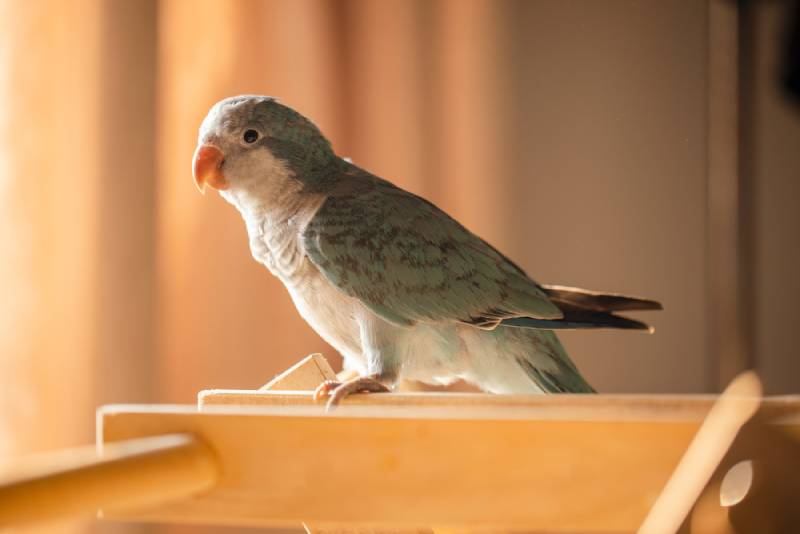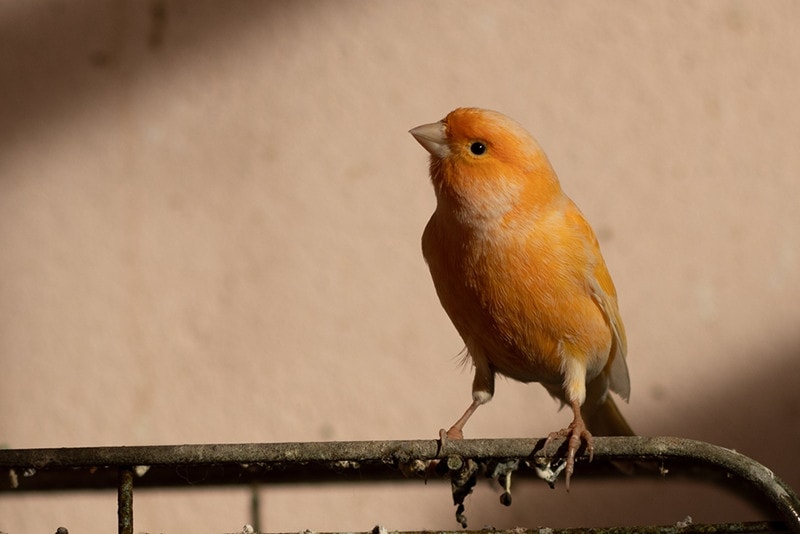How Long Do Parakeets Live? Vet-Reviewed Average Lifespan, Data & Care
By Jessica Kim
Updated on
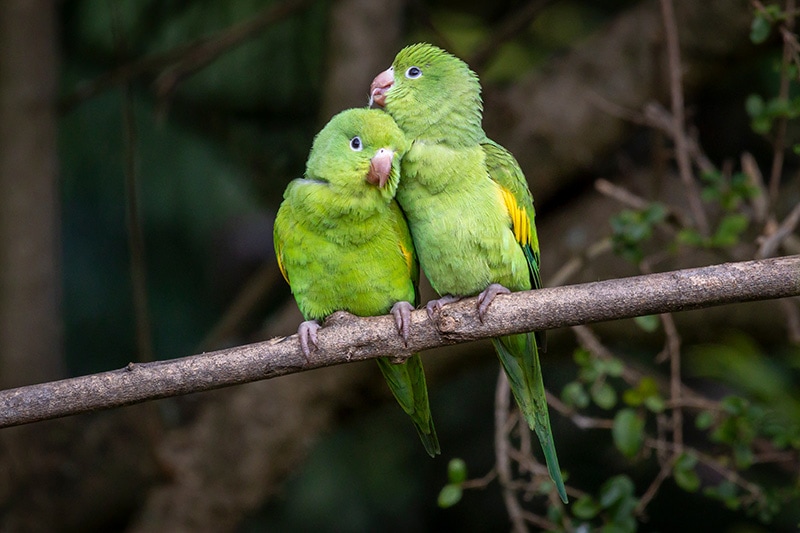
This article has been reviewed for accuracy by a qualified veterinarian. It should not be considered a complete care guide, nor is it intended to replace veterinary advice tailored to your specific pet. Bird owners are urged to consult with their veterinarian about their pet’s health and care.
Click to Skip Ahead
Parakeets are popular household pets, and they often become fun and playful companions for their owners. Parakeets are a group of small parrots, comprising around 115 species of bird. With so much diversity within this group of birds, there are species differences as you can imagine. Each species has its own expected lifespan and special care requirements. In addition, some of these species may be endangered and illegal to own as pets.
In this article, we will be focusing on the budgerigar (Melopsittacus undulatus), commonly referred to as a parakeet. Here’s everything you need to know about parakeets’ lifespan and how you can help them develop a healthy lifestyle that promotes longevity and protects their wellbeing.
Parakeet Average Lifespan
Parakeets can live relatively long and healthy lives as pets. The average lifespan for pet parakeets ranges between 7–15 years, although some will live longer than this. The lifespan of your parakeet depends on a variety of genetic and environmental factors. Taking good care of your parakeet can increase the likelihood of them living longer.

How Long Do Parakeets Live in the Wild?
Parakeets’ life expectancies decrease drastically in the wild. Most wild parakeets will live between 4–6 years. Factors such as disease, inadequate food sources, wild predators, and inclement weather can all lower life expectancy rates for parakeets.
How to Care for Your Parakeet for a Long Lifespan?
While there are no guaranteed methods to extend your parakeet’s lifespan, there are some things you can do to increase the chances of them living long and healthy lives. Here are some factors to consider when caring for your parakeet.
1. Feeding & Diet
Diet plays an important role in keeping your parakeet healthy and happy. Feeding your parakeet well-balanced meals every day ensures that they’re getting all their nutritional needs met. While parakeets typically enjoy eating seeds, a seed-based diet isn’t recommended for pet parakeets. Seeds typically contain a lot of fat, and they don’t contain all the nutrients that parakeets need for healthy daily functioning. They can often put parakeets at risk of nutrient deficiencies.
In general, it’s best to feed parakeets a species-appropriate pellet-form diet and incorporate fresh produce and seeds as occasional snacks or special treats. Pellet food is often recommended as the main food source for parakeets because it does a better job of providing a well-balanced meal. Pellets contain a blend of all the essential nutrients that parakeets need. Since they come in uniform shapes and contain equal amounts of nutrition, it’s less likely for your parakeet to miss out on nutrition. They also prevent picky eating habits, as parakeets can’t pick and choose what to eat like they would be able to with a seed mix.

2. Environment
Despite being small birds, parakeets thrive in bigger spaces. They often do better in cages that are wider than they are tall. Since parakeets tend to enjoy climbing on their enclosure bars, make sure to purchase a cage with bars that are no more than half an inch apart (this is also so they cannot escape through the bars of the cage). Make sure that the cage is made with non-toxic materials.
Parakeets also like perches placed throughout their enclosure. The perches should be different widths to prevent pressure sores on their feet. They often prefer having a perch that’s set higher up in their enclosure, as this provides a safe spot to rest and sleep. Make sure to add a few engaging toys because these intelligent birds love a fun challenge and can get bored easily.
The placement of the enclosure is important to maximize the welfare of your bird. Make sure that the enclosure is in a central area as parakeets thrive on social interactions. However, avoid areas that are too noisy and keep away cats and dogs, as these can be stressful for your parakeet. The enclosure also shouldn’t be placed right next to a window because draft and direct sunlight can be uncomfortable. In addition, fumes such as those from diffusers, Teflon-coated cooking instruments, chemicals, etc. are harmful to your bird and should be avoided.
3. Care
Parakeets are social birds that are capable of forming strong bonds with their owners. They require plenty of daily interaction to stay happy and prevent behavioral problems. They’re intelligent birds that can enjoy learning new tricks and engaging in enrichment activities.
It’s also important to incorporate exercise into their daily routine. Parakeets will enjoy spreading their wings and spending time outside their enclosure. So, it’s important to have a safe room for them to fly around in and explore.
Parakeets have basic grooming needs. They often enjoy baths and will appreciate being misted with a spray bottle a couple of times a week. They may also need their nails and beak trimmed every few months. It’s important to take your parakeet to a veterinarian to get this done, as incorrect trimming can cause significant stress on them.
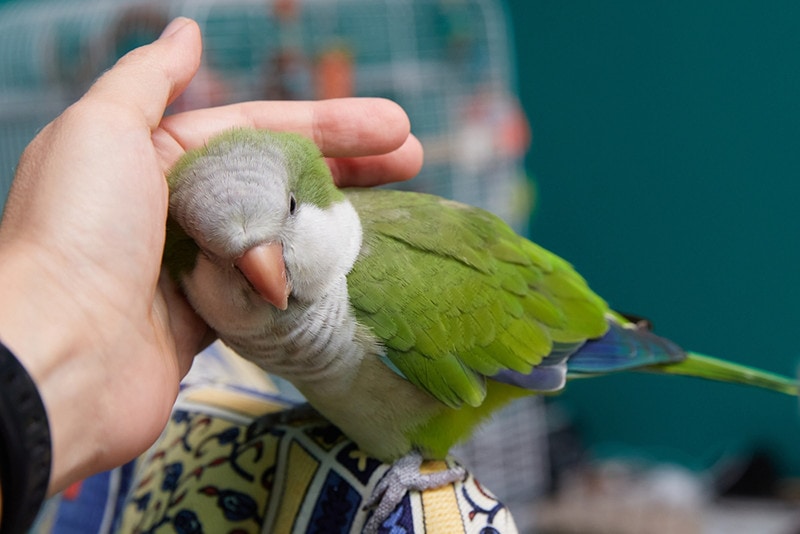
4. Cleaning
Keeping your parakeet’s enclosure clean and sanitized will reduce the risk of contracting infectious diseases. You can spot-clean your parakeet’s cage daily or every other day. The entire cage should be washed at least once a week with non-toxic disinfectant or soap. Food and water dishes should be washed daily after your parakeet’s last meal.
5. Pairing/Breeding
Since parakeets are social birds, they tend to do well when they live in pairs. Having two birds can help parakeets feel less lonely. So, if you can’t spend a lot of time with your parakeet consistently every day, it might be better for their well-being to live with another bird.
It’s not recommended to keep pet parakeets for breeding. Mating rituals can occasionally cause conflict between birds, and caring for a breeding parakeet comes with challenges that require specialized knowledge and care. Breeding parakeets can end up putting their health at risk, especially if they’re with inexperienced owners. The best way to prevent breeding is to have two birds of the same sex living together.
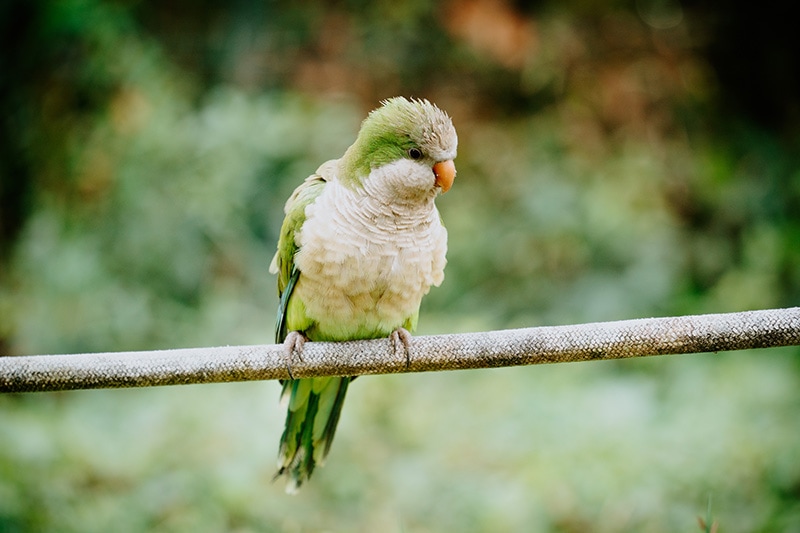
6. Healthcare
It’s beneficial for parakeets to have semi-annual veterinary checkups. Veterinarians will perform a physical exam and can trim your parakeet’s nails, beak, and feathers if needed. Consistently going to routine veterinary care appointments can prevent disease and provide helpful insight that can help you maintain a healthy lifestyle for your parakeet.
The Life Stages of a Parakeet
- Hatchling
- Nestling
- Fledgling
- Juvenile
- Adult
Parakeets typically lay roughly five eggs at a time. Their eggs take 18 days on average to hatch. Once they hatch, they’ll remain in their nest for about 30–40 days. They can reach sexual maturity at 6 months.
Conclusion
Overall, a parakeet usually lives between 7–15 years, while some can live around 20 years. While genetics play a role in their longevity, other controllable factors, like diet, enclosure, and exercise, can affect the length of their lifespan.
Keeping a parakeet happy and healthy will lower the risk of diseases and developing health complications. So, it’s essential to set up a safe and stress-free living environment for parakeets and feed them a well-balanced, nutritious diet. Providing plenty of enrichment activities and toys and meeting their companionship needs will also promote a healthy and active lifestyle.
Featured Image Credit: Pe3k, Shutterstock



